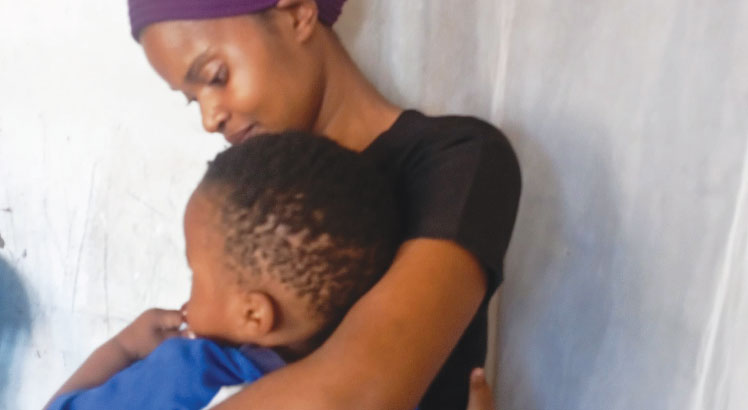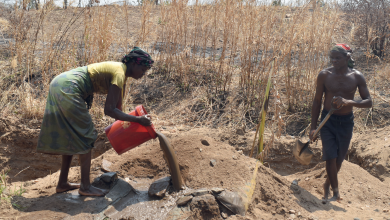Women fighting for dignified maternal care
When Lynes Manduwa miscarried, nurses in the gynaecology ward at Queen Elizabeth Central Hospital (QECH) ganged up to confront the husband.
“They confronted him for impregnating me [a woman with disabilities] and blamed him for the miscarriage which was actually due to biological reasons that even women without disabilities would experience.
“I am certain they do awful things to women with disabilities seeking maternal health care. I lost a colleague who tried to deliver by herself at home because she was mistreated in her previous hospital visits,” claims the 58-year-old, who has mobility challenges.
Manduwa uses crutches and a wheelchair interchangeably according to the need.
Her suspicion derives from her experience at antenatal clinics during all her four pregnancies.

“I was always told to wait for the doctor because nurses considered me a special case. Everyone would be attended to by the midwife except me,” recalls Manduwa.
She says there is a big gap in sexual reproductive health (SRH) justice for women like her, attributing it to myths that women with disabilities have a different biological makeup.
Labour wards lack special needs washrooms, making it hard for them to use the facilities.
“There is a need for adjustable beds. Ambulances are also inaccessible. All these factors compromise our privacy as we have to rely on others for help,” Manduwa says.
Twelve out of 100 Malawians aged five and older have a disability, according to Malawi’s 2018 Population and Housing Census.
Although Malawi has several policies and an Act stipulating the need to respect disability rights, including health service provision, pregnant women with disabilities face a myriad of challenges.
Language barriers
For women with hearing and speech impairment, such as Fanny Malemia, communication challenges have resulted in dire consequences.
“I lost a three-month old pregnancy because of poor communication with health workers,” reveals the 29-year-old Blantyre resident interviewed through a sign language interpreter.
In 2018, she experienced bleeding and abdominal pain while pregnant.
But due to poor communication skills, health workers at Zingwangwa Health Centre failed to decipher her situation until a friend accompanied her to QECH.
A scan revealed that Malemia had an ectopic pregnancy—a life threatening situation where the baby develops in the fallopian tube.
“The fallopian tube had decomposed and I needed emergency surgery,” she looks away, fighting a tear, distressed by the memory of her loss.
Malemia recollects: “I endured a double psychological battle because the experience affected my marriage. My next pregnancy the following year revived the almost broken down union.”
A sign language interpreter from the local church she attended accompanied her and the husband, who is also deaf, on antenatal visits.
Bishop Emmanuel Zalira said he regarded the gesture as a calling to help Fanny through this journey.
“She was lucky, but I noted the suffering of women with disabilities at our public health facilities. I was also uncomfortable among women whose discussions mostly centred on sexuality issues and safe motherhood.”
Malawi National Association for the Deaf (Manad) says miscommunication between health workers and their members are common.
Manad executive director Bryson Chimenya says lack of sign language interpreters in health facilities makes it difficult for women with hearing impairment to communicate with health personnel.
“Deaf women face numerous challenges. Healthcare professionals display unfavourable attitudes towards them,” he says.
No specialised training
Midwives Association of Malawi (MAM) president Keith Lipato says it is sad that women such as Manduwa and Malemia endured such treatment.
He says their professional vow and calling are to offer comprehensive midwifery care without discrimination.
“At any given opportunity and through continued professional development sessions, we remind our members of the need for respectful maternity care,” Lipato said.
He admits that midwives lack specialised training to care for those with speech and hearing disabilities.
“The curriculum needs content on caring for patients with disabilities to prepare the midwives,” he suggests.
Lipato urges women with disabilities to report any ill-treatment to MAM.
No official complaints
QECH director Dr. Kelvin Mponda, whose institution treats about 400 000 patients annually, says the hospital has never received any complaints about discrimination or mistreatment based on one’s disability.
“We are open to diverse views on how we can improve patient care. We would be happy to hear from any section willing to help us make the hospital environment more responsive to their specific needs,” he says.
If a patient and provider cannot communicate, he says it is within their ethics to have a family member present to ensure appropriate medical care and for the patient’s comfort.
“Abusing patients in any form doesn’t reflect the position of QECH towards any section of society. With proof, this is a punishable offence,” he says.
But Federation for Disability Organisations in Malawi (Fedoma)executive director Simon Munde says there are no documented cases because some survivors opt to suffer in silence.
“It’s common for health personnel to express their disappointment or shock when a woman with disability falls pregnant.
“We advocate with authorities to ensure disability inclusive health service delivery in all health facilities. With support from Sight Savers and UK Aid Match, we have trained health workers in gender and disability mainstreaming,” he says.
Ministry of Health director of reproductive health Doreen Ali admits that the sector lacks trained health care workers to communicate with women with speech and hearing impairment.
She says the Department of Policy and Planning in the Ministry of Health is working on training special needs health workers.
Ali says the ministry also plans to review health workforce curricula to enhance a human-rights based and intersectional approach to disability, including psychosocial, intellectual and cognitive disability, to address stigma, stereotyping and discrimination in health service delivery.
She adds that the Reproductive Health Department developed obstetric protocols for the management of ectopic pregnancies and bleeding.
Policy exclusion
At the expiry of the National Disability Mainstreaming Strategy and Implementation Plan (NDMS & IP) 2018 – 2023, the policy failed to achieve its strategic goal of attaining the highest attainable standard of health by persons with disabilities.
This is regardless of the fact that the document acknowledges that access to health services by persons with disabilities remains comparatively limited due to critical shortage of human resource.
Sexual and reproductive health justice expert Dr. Godfrey Kangaude says every country should ensure “reasonable accommodation” to ensure persons with disabilities have the same quality SRHR services as everyone.
He says it’s unethical for health care workers to demean women with disabilities.
“This is a violation of a person’s dignity and autonomy, to be considered unworthy to reproduce. Women with a disability also want to be pregnant and they shouldn’t be derided for it,” says Kangaude.
Malawi Council for Disability Affairs (Macoda) public relations officer Harriet Kachimanga expresses ignorance on any specific initiatives.
She says they are engaging the Ministry of Health on its obligations under the newly enacted Malawi Persons with Disabilities Act, 2024.
Section 25 of the Act obliges health institutions to provide accessible health services tailored to the specific needs of persons with disabilities.
It further prohibits any form of discrimination in the provision of health care and rehabilitation services.
“We believe that accessible maternal health services are vital for ensuring that women with disabilities receive the care and support they need during pregnancy and childbirth,” Kachimanga said.
Malawi’s policies detract from international agreements she is party to, such as the Convention of the Rights of Persons with Disabilities—an international agreement protecting the human rights of people with disabilities.
It is also part of the African Disability Protocol— a legal framework where African Union member States are expected to formulate disability laws and policies to promote disability rights in their countries.n
This story was supported by the Pulitzer Center through Underreported stories in Africa project





